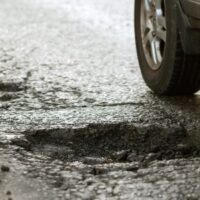When Poor Road Conditions Contribute to Fatal Car Accidents: Who Is Liable?

Not all car accidents are caused by driver error. In some tragic cases, poor road conditions play a significant role in fatal collisions. Uneven pavement, potholes, inadequate signage, missing guardrails, or defective traffic signals can all create hazards that lead to serious or deadly crashes. When a loved one dies in an accident caused or worsened by dangerous roadway conditions, surviving family members may wonder: who is responsible?
In Florida, determining liability for a fatal car accident caused by road defects can be legally complex. While a negligent driver may still share some responsibility, government entities or private contractors tasked with maintaining the roadway could also be held accountable.
Our West Palm Beach car accident attorneys explore how poor road conditions contribute to fatal accidents, who may be legally liable, and what steps grieving families can take to pursue a wrongful death claim.
How Poor Road Conditions Cause Fatal Accidents
Defective or poorly maintained roadways can be just as deadly as a reckless driver. In many cases, road hazards give drivers little or no time to react, leading to high-speed crashes, rollovers, or multi-vehicle pileups. Common examples of dangerous road conditions include:
- Potholes and crumbling pavement, which can cause a driver to lose control of the vehicle or blow out a tire.
- Standing water or inadequate drainage, which increases the risk of hydroplaning.
- Faded lane markings or missing signage, leading to confusion at intersections or turns.
- Malfunctioning traffic lights, which may result in collisions at busy crossroads.
- Broken guardrails or missing barriers, which fail to prevent vehicles from veering off the road.
- Road construction debris or poor detour signage, creating unexpected obstacles for drivers.
When one or more of these conditions contributes to a fatal accident, the cause must be thoroughly investigated to determine if negligence by a public agency or private contractor played a role.
Who Is Responsible for Maintaining Florida Roads?
Liability for road maintenance depends on who owns or controls the roadway. In Florida, different types of roads fall under different jurisdictions:
- City or county roads are typically the responsibility of local government agencies.
- State roads and highways are maintained by the Florida Department of Transportation (FDOT).
- Interstates or federal highways may fall under joint state and federal jurisdiction but are often maintained by the state.
- Private roads or those within gated communities may be maintained by private developers or homeowners’ associations.
- Construction zones may be overseen by a private contractor hired by a public agency.
Each of these entities has a duty of care to maintain their roadways in a reasonably safe condition. If they fail to identify and fix a hazard—or create a hazard through negligence—they may be held liable for resulting injuries or fatalities.
Can You Sue a Government Entity for a Fatal Roadway Accident?
In Florida, sovereign immunity laws generally protect government entities from lawsuits. However, Florida Statute § 768.28 provides exceptions that allow individuals to file claims against the government in cases of negligence. This includes accidents caused by:
- Failure to repair a known hazard, such as a pothole or broken traffic signal.
- Failure to install adequate safety features, like guardrails or warning signs.
While suing the government is permitted under Florida law, it comes with certain restrictions:
- Notice requirements must be followed before filing a lawsuit.
- Damage caps may apply. Florida law limits damages against a state or local entity to $200,000 per person and $300,000 per incident, regardless of how many people are affected.
Given these limitations, wrongful death claims against government agencies require careful legal navigation and thorough evidence gathering.
Can Private Contractors Be Held Liable?
In some cases, road maintenance or construction is handled by a private company under contract with a government agency. If the company failed to follow safety protocols, left debris on the road, or improperly installed signs or barriers, they may be held liable for a fatal accident.
Unlike government entities, private contractors are not protected by sovereign immunity, so claims against them do not face the same damage caps or procedural hurdles. However, it must be proven that the contractor’s negligence directly contributed to the cause of the fatal crash.
Establishing Fault in a Fatal Accident Caused by Road Conditions
To succeed in a wrongful death claim involving poor road conditions, the deceased’s family must prove that:
- A dangerous condition existed on the roadway.
- The responsible entity knew or should have known about the condition and failed to fix it within a reasonable amount of time; or created the hazard through negligence.
- The hazardous condition was a direct cause of the fatal accident.
This often requires expert testimony from accident reconstructionists, engineers, or road safety specialists, as well as documentation showing prior complaints, maintenance records, or other accidents at the same location.
Contact Smith, Ball, Báez & Prather
When a fatal car accident occurs due to poor road conditions, grieving families deserve answers—and justice. While holding government agencies or contractors accountable can be complex, it is possible when there is sufficient evidence of negligence. Understanding who is responsible for maintaining the roadway, and taking the right legal steps, can help surviving family members pursue the compensation they need and prevent future tragedies.
If you’ve lost a loved one in a fatal car accident involving dangerous road conditions, the attorneys at Smith, Ball, Báez & Prather are here to help. We have the experience and resources to investigate complex liability issues and hold negligent parties accountable.
Contact us today for a free consultation to discuss your legal options and begin the path toward justice.
Source:
leg.state.fl.us/statutes/index.cfm?App_mode=Display_Statute&URL=0700-0799/0768/Sections/0768.28.html
